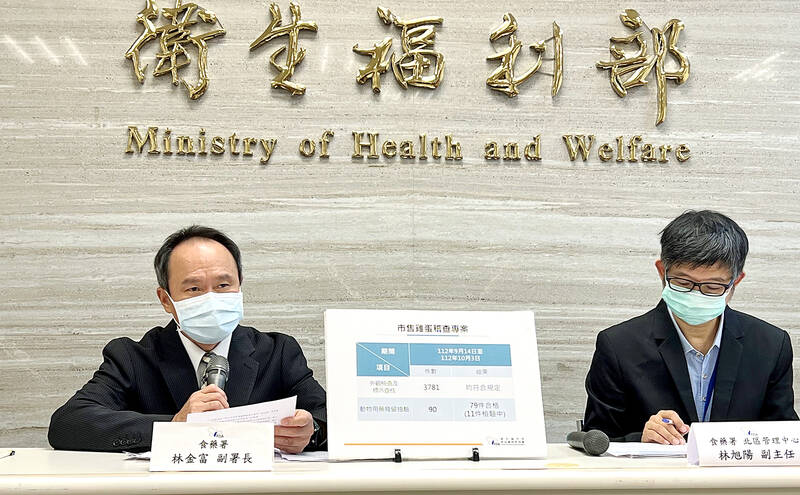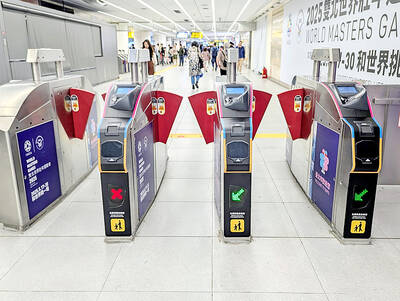The Food and Drug Administration (FDA) yesterday said that all 3,781 eggs sold at retailers nationwide passed its inspection of appearance and labeling requirements, while 11 of 90 sampled items are still being tested for animal drug residues.
Responding to recent controversies about government-imported eggs, the FDA last month launched a four-month enhanced inspection program for eggs still in their shells.
FDA Deputy Director Lin Chin-fu (林金富) said the inspection is conducted on eggs sold in supermarkets, convenience stores and retailers across the nation, mainly focusing on appearance and packaging labels.

Photo: CNA
A total of 3,781 items were inspected from Sept. 14 to Tuesday, and all of them met appearance and labeling requirements, he said, adding that 90 items were randomly sampled and tested for animal drug residues, and so far 79 items have passed, while 11 are still being tested.
Lin said the FDA had encouraged people to report suspected quality problems by calling the agency’s 1919 food safety hotline, but it had only received three calls from Sept. 1 to Tuesday, including two callers who were unwilling to leave their contact information.
One of the two callers said the bad eggs had been disposed of, and the other caller also asked whether she would be sued or investigated by government officials if she shared on Facebook the bad eggs she purchased, Lin said, adding that as they did not leave their contact information, the FDA could not follow up on the cases.
Only one caller left his contact information as he reported an upset stomach after eating eggs, and hoped the government would tighten its egg quality control, he said.
Meanwhile, the FDA on Tuesday evening reported that 37,216 pork and pork products have been inspected for required country-of-origin labeling so far this year, and nine items have failed.
Seven items have been fined NT$219,000 in total, while the other two items are still being dealt with, it said.
The FDA said that eight items did not mark the country of origin of the pork ingredient, while one item was found with false labeling — a “hot pot pork slices” product made of reconstituted meat, marked as “from Canada,” was found either made of frozen pork imported from the US or made of mixed pork from the US and Canada.
Lin said the Taoyuan Department of Public Health has asked the frozen food company that sells the falsely labeled “hot pot pork slices” to recall the products that had been manufactured before Aug. 20, and relabel them with the correct information.
The company would also be investigated by the local prosecutors’ office for alleged contraventions of the Act Governing Food Safety and Sanitation (食品安全衛生管理法), he said, adding that the FDA would test samples of US pork for ractopamine residue.

A magnitude 6.4 earthquake struck off the coast of Hualien County in eastern Taiwan at 7pm yesterday, the Central Weather Administration (CWA) said. The epicenter of the temblor was at sea, about 69.9km south of Hualien County Hall, at a depth of 30.9km, it said. There were no immediate reports of damage resulting from the quake. The earthquake’s intensity, which gauges the actual effect of a temblor, was highest in Taitung County’s Changbin Township (長濱), where it measured 5 on Taiwan’s seven-tier intensity scale. The quake also measured an intensity of 4 in Hualien, Nantou, Chiayi, Yunlin, Changhua and Miaoli counties, as well as

Credit departments of farmers’ and fishers’ associations blocked a total of more than NT$180 million (US$6.01 million) from being lost to scams last year, National Police Agency (NPA) data showed. The Agricultural Finance Agency (AFA) said last week that staff of farmers’ and fishers’ associations’ credit departments are required to implement fraud prevention measures when they serve clients at the counter. They would ask clients about personal financial management activities whenever they suspect there might be a fraud situation, and would immediately report the incident to local authorities, which would send police officers to the site to help, it said. NPA data showed

ENERGY RESILIENCE: Although Alaska is open for investments, Taiwan is sourcing its gas from the Middle East, and the sea routes carry risks, Ho Cheng-hui said US government officials’ high-profile reception of a Taiwanese representative at the Alaska Sustainable Energy Conference indicated the emergence of an Indo-Pacific energy resilience alliance, an academic said. Presidential Office Secretary-General Pan Men-an (潘孟安) attended the conference in Alaska on Thursday last week at the invitation of the US government. Pan visited oil and gas facilities with senior US officials, including US Secretary of the Interior Doug Burgum, US Secretary of Energy Chris Wright, Alaska Governor Mike Dunleavy and US Senator Daniel Sullivan. Pan attending the conference on behalf of President William Lai (賴清德) shows a significant elevation in diplomatic representation,

The Taipei MRT is to begin accepting mobile payment services in the fall, Taipei Rapid Transit Corp said on Saturday. When the company finishes the installation of new payment units at ticketing gates in October, MRT passengers can use credit cards, Apple Pay, Google Pay and Samsung Pay, the operator said. In addition, the MRT would also provide QR payment codes — which would be compatible with Line Pay, Jkopay, iPass Money, PXPay Plus, EasyWallet, iCash Pay, Taiwan Pay and Taishin Pay — to access the railway system. Currently, passengers can access the Taipei MRT by buying a single-journey token or using EasyCard,